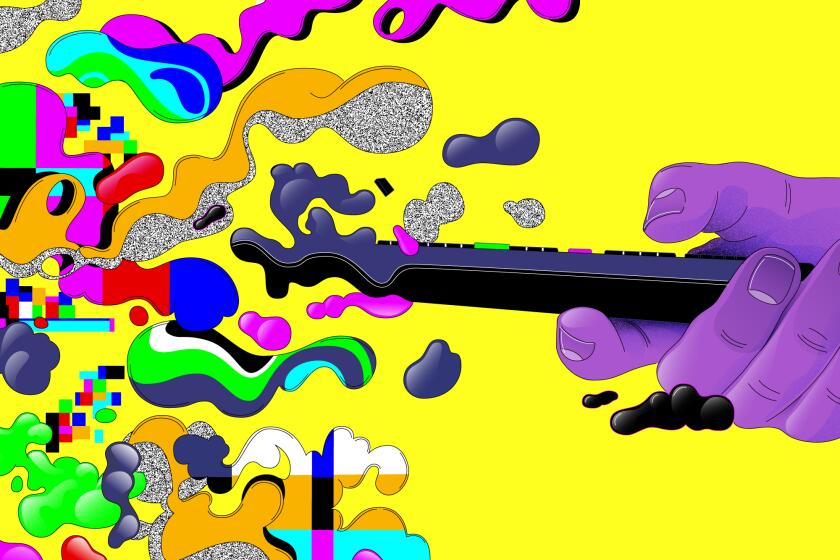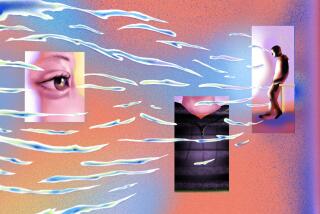An Angeleno searched the globe for the meaning of happiness. Here’s what he learned
If it was up to Ravi Patel, everyone he loves — friends, family, parents — would all live together in one big, happy neighborhood.
Instead, he got to fly them around the world.
The actor’s new show, “Ravi Patel’s Pursuit of Happiness,” premiered Thursday on HBO Max. Four chapters in four countries (Mexico, Japan, South Korea and Denmark) examine four key pieces of the actor’s own happiness. More than anything, that means people.
“In general, you’re the average of the people around you,” Patel said in an interview via video conference. “Be really picky about who you keep around you and be intentional about it. And … elevate those people. Give them as much love as you can.”
In true “Frank Sinatra Has a Cold” fashion, The Times talked to Patel’s chosen family — that is, all of the guests on the show — about how it impacted their idea of happiness.
With profound change comes possibility: As we enter the 2020 fall season, TV has not only the opportunity, but the need, to do so. Here are some ways it might.
Episode 1: ‘Growing Old in Mexico’

The first episode features the folks who started it all: Ravi’s parents, Champa and Vasant Patel. They’re so important, in fact, that they also starred in Ravi’s 2014 autobiographical documentary, “Meet the Patels,” a “real life romantic comedy.”
The Times talked to them from their home in Charlotte, N.C., where Ravi and his sister Geeta grew up. Their setting had this writer fooled — the soaring pines behind them, were not, in fact, a virtual Zoom background. Turns out that’s the Patels’ backyard, where Champa and Vasant host Laughing Yoga.
Their episode was inspired, like the rest of the show, by a conversation between Ravi and his therapist. Each episode stems from a big question the actor talked about in therapy. Ravi wanted to know: What could he talk to his parents about today that he might wish he had asked later?
The answer: retirement. The first episode flies the audience to Mérida, Mexico, and introduces us to a vibrant community of expat retirees.
“I think their joy was just in finding the same age, same type of chemistry-matching friends who they can spend time together with,” Champa said. “That was really what I call happiness.”
Champa and Vasant fit right in. They eat, drink and make merry with their new friends — they even celebrate Champa’s birthday on the beach together. The experience cemented Vasant’s view of joy.
“Happiness is when we see loved ones and people,” he said. “Love is something — the more you give, the more you get, and the more you create inside.”
Episode 2: ‘Overparenting in Japan’
Like father, like son: Ravi finds happiness in the people and the love around him. And he’s constantly cultivating it — especially with his wife, Mahaley.
Mahaley’s episode takes us to Japan, introduces us to the adorable Amelie (the couple’s now 4-year-old daughter) and talks parenting — or rather, American overparenting.
After trailing a 6-year-old (also adorable) on his hajimete no otsukai (first errand), Mahaley saw the concept of community in a fresh light.
“Japan highlighted for me what I already knew about L.A.: There’s great things about the city, but ultimately I think it’s really hard here to feel like you have a community, even when you do,” she said. “Because I know we have a strong community. But the city doesn’t make it easy.”
With its sprawling spread and infamous traffic, Los Angeles certainly doesn’t make it easy to let a youngster run an errand on their own. But both parents have found their tribe within the city.
“If you have people around you that you can rely on, you can trust, you can confide in, to me that is the epitome of happiness,” Mahaley said. “It’s really just the people that you’re surrounded by.”
The actress is also training to become a marriage and family therapist and knows the “choose happiness” axiom isn’t one size fits all. But it works for her.
To kick off our 2020 fall TV preview, the Times TV team selects the 15 shows we’ll be watching this fall — and that you should be watching too.
Episode 3: ‘Work hard, play hard in South Korea’
That axiom also works for Patel’s next guest, Matt Pohlson. Patel and Pohlson met years ago (something about selling a used car and an exorbitantly long email) and have been close ever since. Pohlson is also one of the happiest people Patel has ever known.
One thing they share in common? A propensity to overwork. The show took the two of them to South Korea to learn a thing or two about work-life balance.
There was no better person for the job. After a lot of hard work being co-founder and chief executive at Omaze, Pohlson died. A year ago, he flatlined for four and a half minutes before a successful resuscitation. The show took Pohlson and Patel to a South Korean “death cafe,” where they simulated their own funerals to learn the importance of life.
“It was a really powerful experience,” Pohlson said. “But it was also a really fun experience, because I was sitting next to Ravi. We were both really emotional but also laughing like fourth-graders in a class where they’re not supposed to laugh.”
Throughout the show, Patel cracks jokes left and right, deadpanning in true mockumentary style. (He’s “completely unaffected” by the camera, he says.) Right before the pair climbs into their own “coffins,” he’s quipping about seating arrangements.
Once they were inside, though, things got serious. The gravity of Pohlson’s near-death experience hit home.
“Just immense gratitude that this thing happened a year ago, I was supposed to die, and now I get to go to South Korea with one of my best friends, as his dream is coming true, trying to spread happiness,” he said. “That I got to be part of that was just a dream come true.”
Episode 4: ‘Immigrants & the Border in Denmark’
Perhaps the most timely episode, though, comes in Copenhagen . Enter Abdullah Saeed: He’s a former journalist and current TV writer with a lot of thoughts on immigration.
“I think what you see in Denmark, post-Syria,” Saeed said, “it’s a real flashpoint when it comes to the conflict between Muslim immigrants and refugees and the majority culture in the countries they end up in.”
The last episode talks American immigration through the lens of the refugee crisis that Europe experienced in 2015 after the Syrian civil war. Denmark might have taken in more than 2,000 refugees, but its homogeneous makeup has made acceptance difficult. One conversation with a Syrian refugee revealed a man haunted by past hardships, seeking a new lease on happiness.
“I think you can’t experience happiness without sadness, in a lot of ways,” Saeed said. “What I love about the show, and what I loved about … going there with Ravi was exploring the sadness, exploring the negative emotions, to get to the happiness and to the positive emotions and to the togetherness.”
For Patel, the Denmark episode embodies a problem that is “urgently American.” Each chapter of the show delves deeper: Mexico is about retirement, yes, but it’s really about aging and family. Japan starts with parenting but became a turning point in Patel’s marriage. South Korea explains how a “myopic desperation” for success can impact personal fulfillment.
“It’s the pursuit of happiness,” Patel said. “It’s the effort and the intention that we put into our lives and the people we love, and just the process of trying to improve that, in and of itself, I suspect makes you quite happier.”
More to Read
The complete guide to home viewing
Get Screen Gab for everything about the TV shows and streaming movies everyone’s talking about.
You may occasionally receive promotional content from the Los Angeles Times.








